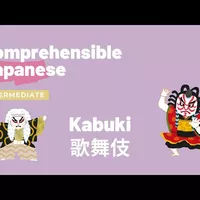Kabuki 歌舞伎 - Intermediate Japanese 日本 語 中級
kabuki|かぶき|intermediate|japanese|にっぽん|ご|ちゅうきゅう
Kabuki - Intermediate Japanese
Kabuki - Intermediair Japans Intermediair Japans
歌舞伎 - 中级日语 中级日语
今日 の テーマ は 「歌舞伎 」です 江戸 時代 から 続く
きょう||てーま||かぶき||えど|じだい||つづく
日本 の 伝統 芸能 「歌舞伎 」に ついて 話します 皆さん
にっぽん||でんとう|げいのう|かぶき|||はなします|みなさん
歌舞伎 ご存知 です か
かぶき|ごぞんじ||
これ が 歌舞伎 です 昔 から 続く 伝統 的な 日本 の 芝居 です
||かぶき||むかし||つづく|でんとう|てきな|にっぽん||しばい|
歌舞伎 は 音楽 と 踊り と 芝居 が 合わさった 舞台 です
かぶき||おんがく||おどり||しばい||あわさった|ぶたい|
これ は 歌舞伎 役者 です
||かぶき|やくしゃ|
歌舞伎 の 俳優 です こんな 風 に 顔 を 白く 塗って 派手な 化粧 を して
かぶき||はいゆう|||かぜ||かお||しろく|ぬって|はでな|けしょう||
He's a Kabuki actor, and he paints his face white like this, and he wears a lot of makeup.
派手な メイク を して 着物 を 着て 歌ったり 踊ったり
はでな||||きもの||きて|うたったり|おどったり
芝居 を したり します 歌舞伎 の 役者 さん
しばい||||かぶき||やくしゃ|
歌舞伎 に 出る 俳優 さん は 全員
かぶき||でる|はいゆう|||ぜんいん
男性 です 女性 の 役 も 男性 が 演じます
だんせい||じょせい||やく||だんせい||えんじます
男性 が 女性 の 格好 を して 演じます 皆さん 実際 に 歌舞伎 を 観た こと は あります か
だんせい||じょせい||かっこう|||えんじます|みなさん|じっさい||かぶき||みた||||
実は 私 は 観た こと ない ん です 日本 人 な のに
じつは|わたくし||みた|||||にっぽん|じん||
実際 に 劇場 に 行って 生 で 歌舞伎 の 舞台 を 観た こと は 1度 も ありません
じっさい||げきじょう||おこなって|せい||かぶき||ぶたい||みた|||たび||
ちょっと ここ で 歌舞伎 の 歴史 に ついて 話したい と 思います
|||かぶき||れきし|||はなしたい||おもいます
歌舞伎 が 始まった の は 今 から 400年 以上 も 前 の 江戸 時代 の こと です
かぶき||はじまった|||いま||とし|いじょう||ぜん||えど|じだい|||
1603年 に 出雲 阿国 と いう 女性 が 歌舞伎 踊り
とし||いずも|おくに|||じょせい||かぶき|おどり
と 言わ れる 踊 り を 始めました さっき 歌舞伎 の 役者 さん は 全員 男性 です よ
|いわ||おどり|||はじめました||かぶき||やくしゃ|||ぜんいん|だんせい||
と 言った ん です けど 最初に 始めた の は 女性 でした
|いった||||さいしょに|はじめた|||じょせい|
ちなみに 歌舞伎 と いう 名前 の 由来 は 「かぶ く 」と いう 動詞 だ そうです
|かぶき|||なまえ||ゆらい||||||どうし||そう です
かぶ く と いう 言葉 は 普段 あんまり 聞か ない 言葉 な ん です けど
||||ことば||ふだん||きか||ことば||||
派手な 格好 を する 奇抜な 格好 を する と いう 意味 が ある そうです
はでな|かっこう|||きばつな|かっこう|||||いみ|||そう です
奇抜な 格好 を して 踊って いた ので
きばつな|かっこう|||おどって||
歌舞伎 踊り と 言わ れる よう に なった そうです
かぶき|おどり||いわ|||||そう です
出雲 阿国 の 歌舞伎 踊り が 人気 が 出た ので その 真似 を して
いずも|おくに||かぶき|おどり||にんき||でた|||まね||
女 の 人 たち が 踊る 女 歌舞伎 と いう もの が 生まれました
おんな||じん|||おどる|おんな|かぶき|||||うまれました
Women's Kabuki, in which women dance, was born.
でも 江戸 幕府 が この 女性 たち に よる 女 歌舞伎 を
|えど|ばくふ|||じょせい||||おんな|かぶき|
禁止 しました そして その後 に 今度 は
きんし|||そのご||こんど|
若い 少年 たち かっこいい 美 少年 たち に よる
わかい|しょうねん|||び|しょうねん|||
若 衆 歌舞伎 と いう もの が 生まれました でも これ も
わか|しゅう|かぶき|||||うまれました|||
江戸 幕府 に 禁止 さ れました
えど|ばくふ||きんし||
その後 に 現在 の 歌舞伎 と 同じ よう に 大人 の 男 の 人
そのご||げんざい||かぶき||おなじ|||おとな||おとこ||じん
成人 男性 に よる 歌舞伎 が 始まって それ が 今 も 続いて います
せいじん|だんせい|||かぶき||はじまって|||いま||つづいて|
歌舞伎 は 1600年 代 の 終わり 頃 から
かぶき||とし|だい||おわり|ころ|
広く 一般 の 人 に 楽しま れる よう に なった そうです
ひろく|いっぱん||じん||たのしま|||||そう です
歌舞伎 は もちろん 今 でも 伝統 的な 日本 の 文化 と して
かぶき|||いま||でんとう|てきな|にっぽん||ぶんか||
大切に されて います し 今 も 人気 です けど
たいせつに||||いま||にんき||
どちら か と 言う と 若い 人 たち より も 年配 の 人 たち に 人気 が ある と いう イメージ です
|||いう||わかい|じん||||ねんぱい||じん|||にんき|||||いめーじ|
若い 人 たち より も 年配 の 方 たち が 観る もの と いう イメージ が あります
わかい|じん||||ねんぱい||かた|||みる||||いめーじ||
私 の イメージ だ と ちょっと 難し そうだ なぁ と か
わたくし||いめーじ||||むずかし|そう だ|||
I thought, "This looks a little difficult from my image.
あと は 行き にくい と いう イメージ が あります なんとなく 敷居 が 高くて
||いき||||いめーじ||||しきい||たかくて
I also have the image that it's difficult to get to, that the threshold is somehow too high.
気軽に 行け ない 簡単に 行け ない もの と いう イメージ が あります
きがるに|いけ||かんたんに|いけ|||||いめーじ||
でも 最近 は 今風に アレンジ した 歌舞伎 も 色々 と
|さいきん||いまふうに|あれんじ||かぶき||いろいろ|
上演 されて いる みたいです 例えば
じょうえん||||たとえば
2015年 に は ワンピース の 歌舞伎 が 上演 された らしい です
とし|||わんぴーす||かぶき||じょうえん|||
それ から 2019年 に は ナウシカ の 歌舞伎 も
||とし|||||かぶき|
あった そうです よ 面白 そうです よ ね
|そう です||おもしろ|そう です||
あと 去年 2020年 に は
|きょねん|とし||
ナルト の 歌舞伎 も 上演 予定 だった そうです でも これ は
||かぶき||じょうえん|よてい||そう です|||
残念 ながら コロナ の 影響 で 中止 に なって しまった そうです
ざんねん||||えいきょう||ちゅうし||||そう です
こういう の だ と 若い 人 たち でも 面白 そうって
||||わかい|じん|||おもしろ|
興味 が 湧いて 観て み たく なり そうです よね 私 が 住んで いる 福岡 に も 実は
きょうみ||わいて|みて||||そう です||わたくし||すんで||ふくおか|||じつは
博多 座 と いう 名前 の こんな
はかた|ざ|||なまえ||
立派な 劇場 が あります ここ でも 歌舞伎 が 観られる みたいです
りっぱな|げきじょう|||||かぶき||みられる|
せっかく 近く に ある ので いつか 行って みたいな と 思います
|ちかく|||||おこなって|||おもいます
今日 は 日本 の 伝統 芸能 「歌舞伎 」に ついて 話しました
きょう||にっぽん||でんとう|げいのう|かぶき|||はなしました
今日 は これ で おしまい
きょう||||
また ね

